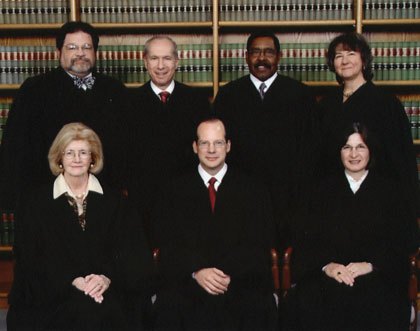NJ Supreme Court Clarifies License Suspension Guidelines
The New Jersey Supreme Court unanimously decided yesterday to clarify the circumstances under which a judge can suspend a driver’s license over a traffic violation. The high court previously had offered no guidance on the subject, leaving lower courts with the discretion to take away the right to drive from motorists for any reason. This happened to Laura Moran who received a 45-day suspension for a reckless driving incident that took place August 3, 2007 at 3am in Aberdeen Township.
Officer Roger Peter observed as Moran used a left-hand turn lane, without turning, to cut in front of a semi truck at an intersection on a green light. Moran was admittedly in a bad mood and did not cooperate with the officer. For that, Peter threw the book at her, writing up reckless driving, improper license display and obstructed windshield tickets.
“The reason why I went in front of the tractor trailer is because I wanted to get into that lane, I was in the other lane,” Moran testified. “That’s why I went in front of it.”
Because the trial court likewise found Moran to be “highly emotional, obstreperous and disruptive” on the stand, it imposed a hefty $377 in fines plus the license suspension. The court also noted she had racked up ten minor traffic tickets in the past fifteen years. Moran appealed, claiming that license points created a clear, easily understood system for suspending licenses for bad drivers and that an obscure New Jersey statute allowing judges to suspend licenses for “willful violations” was unconstitutionally vague and failed to give motorists “fair notice” of the potential for punishment. The high court threw out this argument.
“Ignorance of a sentencing provision that is published in the codified laws of this state — and available in bound volumes located in most law firms, in county and state offices, and in many other locales, and online — is not a defense,” Justice Barry T. Albin wrote for the court. “Every person is presumed to know the law.”
The court was more sympathetic with her argument that the law was overly broad.
“The state is not indifferent to defendant’s claim and understands that N.J.S.A. 39:5-31, read literally, gives sweeping discretion to judges to impose license suspensions,” Albin wrote. “The state asks this court to construe N.J.S.A. 39:5-31 in a reasoned way — by enunciating standards channeling the discretion exercised by judges — that will render the statute constitutional.”
The court responded by explaining that an aggravated form of reckless driving — one that a judge found to be deliberate or intentional in the disregard for the lives and property of others — triggered the sentence enhancement of a license suspension. The court explained the difference as one of degree. Regular reckless driving is likely to cause hazard. Aggravated is “highly likely” to cause a hazard. The court then stated it is important to limit the circumstances under which a suspension is imposed.
“However a license to drive is denominated, either as a right or a privilege, a license suspension may not be imposed arbitrarily,” Albin wrote. “The loss of driving privileges for a reckless driving conviction constitutes a consequence of magnitude that triggers certain rights, such as the right to counsel… Random and unpredictable sentencing is anathema to notions of due process.”
The court laid out how a judge should consider a driver’s record, the nature of the offense and whether it caused an accident, the driver’s age and experience, the driver’s attitude, and any potential hardships a suspension would cause. The factors are primarily meant to determine the likelihood that a defendant would commit the same offense again. The trial judge must explain each of these factors in detail for later review by an appellate court.
A copy of the decision is available in a 75k PDF file at the source link below.
New Jersey v. Moran (Supreme Court, State of New Jersey, 7/13/2010)
[Courtesy: Thenewspaper.com]
More by The Newspaper
Latest Car Reviews
Read moreLatest Product Reviews
Read moreRecent Comments
- Brian Uchida Laguna Seca, corkscrew, (drying track off in rental car prior to Superbike test session), at speed - turn 9 big Willow Springs racing a motorcycle,- at greater speed (but riding shotgun) - The Carrousel at Sears Point in a 1981 PA9 Osella 2 litre FIA racer with Eddie Lawson at the wheel! (apologies for not being brief!)
- Mister It wasn't helped any by the horrible fuel economy for what it was... something like 22mpg city, iirc.
- Lorenzo I shop for all-season tires that have good wet and dry pavement grip and use them year-round. Nothing works on black ice, and I stopped driving in snow long ago - I'll wait until the streets and highways are plowed, when all-seasons are good enough. After all, I don't live in Canada or deep in the snow zone.
- FormerFF I’m in Atlanta. The summers go on in April and come off in October. I have a Cayman that stays on summer tires year round and gets driven on winter days when the temperature gets above 45 F and it’s dry, which is usually at least once a week.
- Kwik_Shift_Pro4X I've never driven anything that would justify having summer tires.


































Comments
Join the conversation
Asapuntz, the government is not in business to dispense priveleges. Cars and driving predate licensing by decades. My father was born in 1904 and drove a truck for a living from 1923 until 1930, and had no license. None of the three states where he drove issued them until 1932-34. By that time, there was carnage on America's roads, and the police insisted that the laws regulating the age of drivers, their ability to drive, and knowledge of the rules of the road, were unenforceable without a licensing system. Over huge public objections the licensing requirement was established in state after state, and the overwhelming justification put forth was public safety, and public safety alone. No government had the gall back then to insist it had the power to dispense priveleges. Not only would the courts have struck it down, but elected officials would have been turned out of office.
I'd rather the high court rule over the constitutionality of traffic court. Trial without jury and no peers is sounds very unconstitutional. Nothing new; greed trumps all.